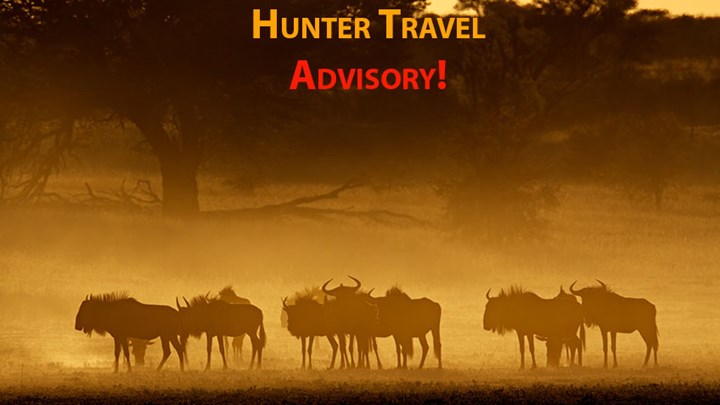
by Steve Scott - Monday, October 1, 2018

Questions regarding proposed land reforms in South Africa have the attention of traveling hunters with good reason. There is now a high likelihood the government will expropriate certain lands from white farmers without compensation. Yet despite tweets from President Trump to the contrary, as of this writing, the actual taking of land has not yet happened. If/when expropriation does occur, it may not have a great effect on the hunting industry. Or will possible land reform destroy the country as we know it?
Since the end of the Apartheid era in 1994, the African National Congress (ANC) party has ruled South Africa. But after nearly a quarter of a century in power, many of the promised reforms have yet to be delivered. South Africa has been in an economic downturn for the past several years and the people are growing impatient with the ANC and President Cyril Ramaphosa. With elections scheduled in 2019, there is a real possibility the ANC could lose control of the government. And as incendiary left-wing Marxist leader of the Economic Freedom Fighters party (EFF) Julius Malema has made land reform the EFF’s primary issue, Ramaphosa and the ANC have been forced to the left on the land-reform issue and are now actively pursuing expropriation of land without compensation.
How would land seizure impact hunting and wildlife conservation?
There are many ways the scenario could unfold. The issue might be just a political maneuver to curry favor with the voters before the election. Ramaphosa is a successful businessman. His holdings even include game-breeding operations. The South African president is aware of the economic calamity that land reforms brought to Zimbabwe and that South Africa could suffer the same fate, which bodes well for the prospect that cooler heads will prevail. On the other hand, a nightmare scenario could be an implementation of mass land expropriation, triggering the collapse of the South African economy and likely armed resistance by small groups of white farmers whose land is being taken, or possibly even the outbreak of a guerrilla-style civil war. Having just returned from South Africa, and after discussing the issues with people with a wide variety of viewpoints, it is my belief the outcome will be somewhere between the two extremes, as evidenced by the fact some of the harsh rhetoric is already being walked back by government officials.
Recently, South Africa’s Parliament approved a decision by the Public Works Committee to withdraw the Expropriation Bill pending the outcome of the Constitutional Review Committee’s review of Section 25 of the Constitution on seizing land without compensation. While the bill’s withdrawal is only a temporary stay on implementing land reforms, it is gratifying at least some members of the nation’s leadership remain interested in following the rule of law.
Another walk-back is from ANC Chairman Gwede Mantashe, who repeated his call for the state to forcibly take over land—but only from those who own more than 12,000 hectares, (30,000 acres), referring to a proposal that apparently would confiscate only land in excess of prescribed limits. If the government plans on confiscating only the “in excess” lands, the likelihood of retaliation and civil unrest is greatly reduced. And yet how things will play out remains educated speculation.
What should hunters do?
For starters, check with your outfitter and/or PH (professional hunter). There should be no better source of information than the PHs of South Africa. If you have booked a hunt for next year or are contemplating one, now is not the time to give up on the country. Even at its very worst in 2009, Zimbabwe was still welcoming hunters with open arms, or at least welcoming the foreign currency we brought. South Africa is a much more developed and complex country and if land reforms begin to push it off the rails, it will undoubtedly be a long, slow process. Remaining in touch with your outfitter is the best way to keep informed about the status of things in South Africa and how current events might affect your hunt. Reading articles on reputable news sites such as BBC and the NRA Hunters’ Leadership Forum website, NRAHLF.org, will keep you updated on happenings that are germane to your decision-making process. In fact, a little uncertainty might be of benefit to your pocketbook as a reduced demand for South African hunts certainly will decrease the cost of your hunt.
Considering South Africa is the most developed nation in Africa, it is not likely to top the list of U.S. State Department travel-warning alerts anytime soon. And remember: Supporting the outfitters and professional hunters of South Africa supports the country’s wildlife as its landowners are its leading stewards of conservation.
Research and a healthy dose of caution are now necessary when deciding on future hunts in South Africa. Fortunately, the informed hunter will continue to have a great number of hunting options. Given the informed support of tourist hunters, South Africa will undoubtedly remain one of the most important hunting destinations in the world for the foreseeable future.
■ ■ ■
About the Author: Steve Scott is a reformed attorney, long-time university instructor and producer and host of the Safari Hunter’s Journal and Outdoor Guide television series on air and online. For more information, visit SteveScott.TV.
E-mail your comments/questions about this site to:
[email protected]
Proudly supported by The NRA Foundation and Friends of NRA fundraising.
